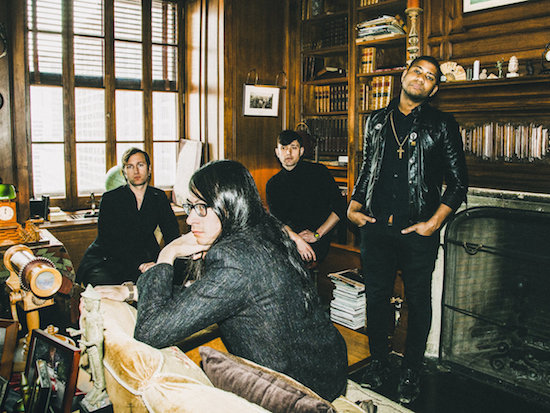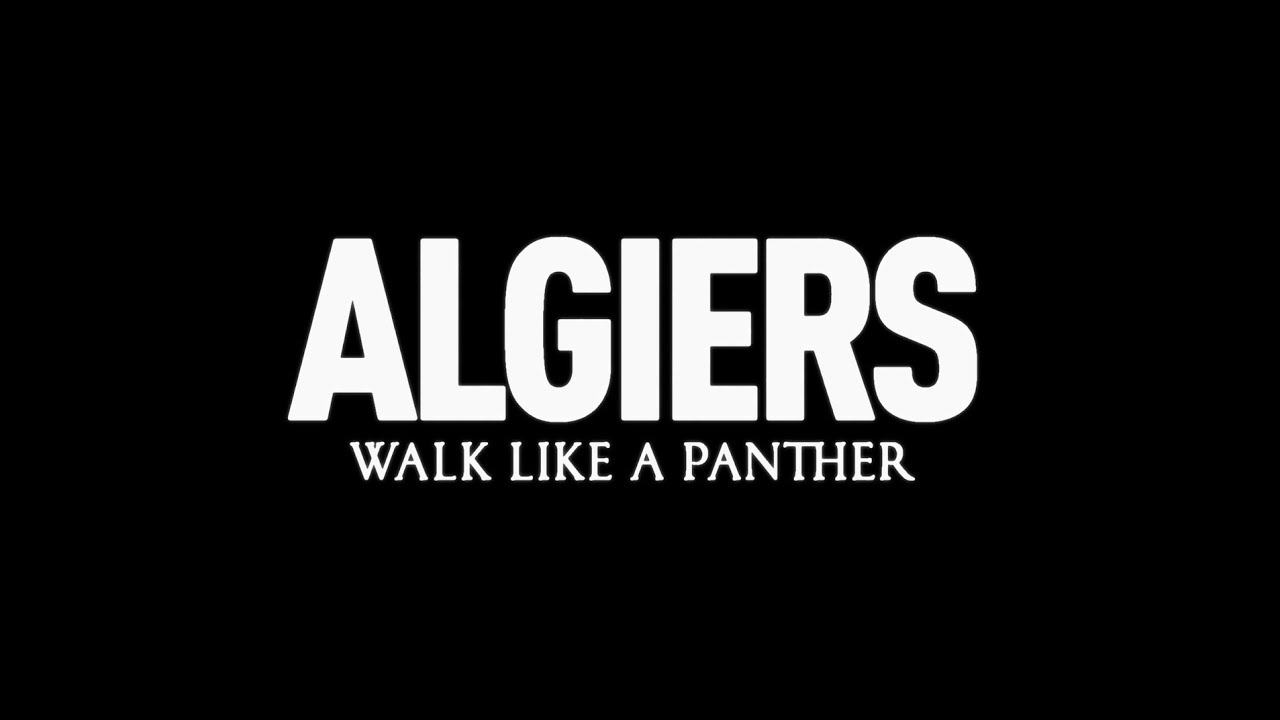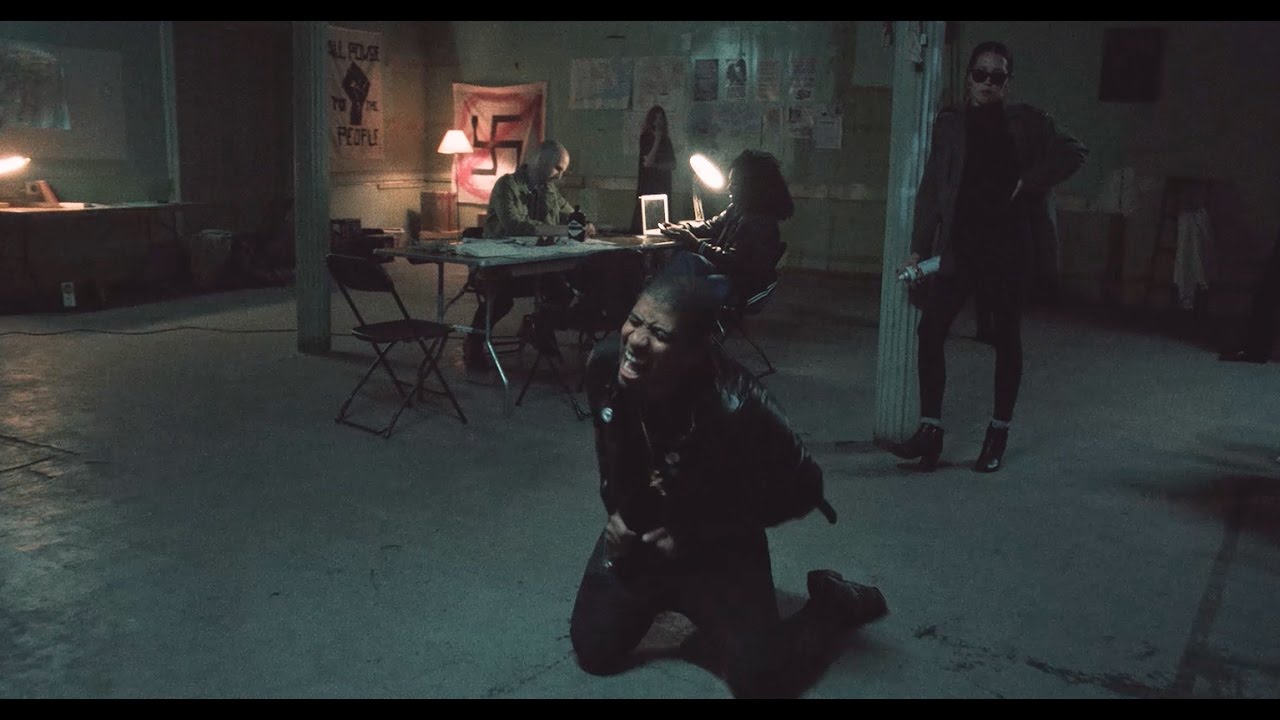On the night before the general election, Jeremy Corbyn made me late for Algiers. The 38 bus got caught up in traffic around London’s Union Chapel, where a huge queue of people had already started to form for the Labour leader’s pre-election rally there later that evening. The delay meant that by the time I reached the rammed Shacklewell Arms it was impossible to get inside the venue. Algiers had already begun their set. I could crane my neck and see bassist Ryan Mahan giving his punk rock Blue Steel and gesticulating in front of a hand-painted banner of a black fist with the words MORE POWER TO THE PEOPLE. I caught glimpses of Matt Tong in a corner, drumming in a dress. Behind a tall bloke, Lee Tesche was hitting a guitar as it hung from the wall somewhere near the back of Franklin Fisher’s head as he sat at his keyboard. I had to make do with a mere impression of the intelligently righteous industrial soul of brilliant new LP The Underside Of Power wafting out at me with the roiling fug of the June heatwave.
Hot air and overly earnest is how I’ve heard more than a few people describe Algiers. They consider the political texts accompanying videos, outspoken interviews and politicised intensity as much of a relic as Corbyn was supposed to be. But catching a glimpse of a news headline predicting a Conservative victory on someone’s phone, I allowed myself to wonder, despite a deep feeling of impending doom, if Algiers might be exactly what’s needed right now.
And the next day, unexpectedly, everything started to change.
Two weeks later Algiers are backstage at Berlin’s Olympic Stadium, halfway through a European tour that involves playing to gigantic audiences as support to Depeche Mode one evening, and their own tiny club gigs the next. "Every night you can add three zeroes or subtract three zeroes" says Tesche, dapper in a black suit jacket and matching buttonhole flower. The monumental scale of this venue, one of the few remaining architectural relics of the Nazi era, is absolutely staggering, the stage is like a matchbox at one end of the the giant donut of seats. It was here where at the 1936 Olympics Jesse Owens trampled Hitler’s dream of Aryan superiority underfoot. In their dressing room, lined with empty hooks for footballers’ kit, Algiers seem markedly unfazed by the pressures of playing gigantic stadia. "It’s more than likely that it’s a once in a lifetime experience," says Fisher, sat on a chair draped with his leather jacket, Black Panther badges on the lapels.
The world has changed dramatically since The Quietus first interviewed Algiers back in 2015. Since then we’ve had Trump, Brexit, shooting after shooting and Black Lives Matter, tensions with Russia and the Syria vortex spinning ever-faster. Back then, Mahan said that "when Franklin, Lee and I first met, we bonded over this shared sense of frustration and powerlessness". Has that bond got tighter? Mahan says so, adding that "Algiers has given me a language through which I can understand things, and articulate them a lot better than I could on my own. It’s much more liberating now".
A coming together, a solidarity, and a sense of liberation seems to permeate everything Algiers have done since Fisher, Mahan and Tesche escaped their Atlanta home to study in the UK. Now spread out across the map (Tesche lives in Atlanta, Mahan in London, Fisher and British drummer Matt Tong in New York) they barely rehearse but work via Wetransfer and Skype, which they feel by necessity pushed their US hardcore and more traditional songwriting roots into more electronic directions. It’s a lot easier to transmit a file than sing down a webcam. "People focus on our being Southern, but we’ve always been internationalists, looking to the world," Mahan says. "The name Algiers comes from that very principle, because it represents something to people around the world, no matter where they came from and what struggle they were involved in." The same goes for their influences. In London in the early 00s they went to umpteen gigs by El-P and British groups like These New Puritans, while now Mahan keeps the rest updated in the latest goings-on in grime. Fisher adds that, "Living in New York I go to see jazz a lot, there’s a band I go to see most every week I can, and I try and incorporate that."
As well as their sonic influences, Algiers have never been shy of expressing the political texts, theories, publications and historical events that have shaped them. Like the Manic Street Preachers, they’ve created a coherent world around them, one that fans might tap into for elucidation. In part, says Mahan, this was a byproduct of the same geographical separation that led them to their unique Euro-American sound. "We didn’t exist in the physical space so we had to create that world," he says. Tesche adds that they were "trying to show our DNA" in a similar vein to the infamous Nurse With Wound list.
For Mahan, his interest in speaking about political theory is a reaction against the anti-intellectualism that surrounded him in the culture of his Southern upbringing: "I made a conscious decision of saying ‘fuck it, I’m going to speak how I want to speak and talk about things the way I want to talk about them’." Fisher though says he has fallen out of love with academia, and is wary of the risk that speaking theory to those who haven’t got the key to the language can be exclusionary and frustrating. "I’ve tried to find a less academically inclined, more expressive artistic way of communicating those very same ideas," he says. And as Tesche points out, "At the end of the day a shit song is a shit song, it doesn’t matter what purpose is behind it".
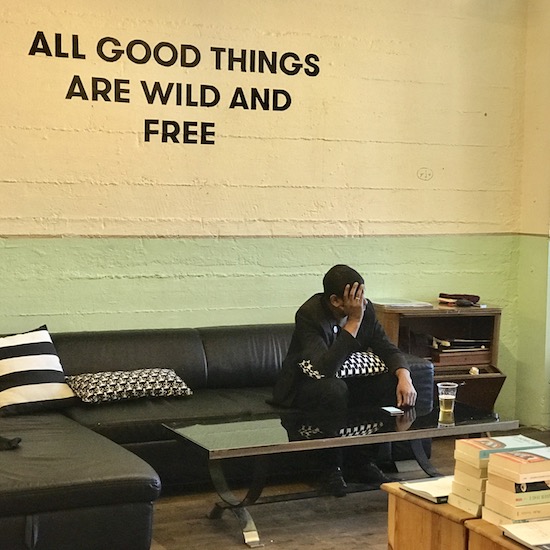
So rather than hammering their message with complex theory, Fisher’s lyricism is evocative, poetic and laced with Biblical references, even as he writes about subjects that few might dare approach. In ‘Walk Like A Panther’, for instance, he sings of a "self-genocide" which, as he explains, "is referring to the way in which the culture industry manufactures false ideas and representations of the African-American identity, which is sold back to them, and which some perpetuate. It’s a critique of the superstructure and how it creates faults and divisions and crises of identity". In terms of celebrity culture? "That, and white-owned corporations that tell black youth how they ought to act, speak, do ABC, like a carrot dangling on a string that brings you into different institutions which helps perpetuate the systems of violence which are visited upon the community". This is something Frank felt around him as he grew up: "It was said to me, ‘You can’t do the same things that your white friends do, because if you get in trouble you’re the one they’re going to come after.’"
It’s a rare experience to interview a relatively new band whose sentences come out of their mouths so eloquent and fully formed. It’s refreshing too to discover that their politics is no mere sloganeering – Mahan’s day job is working as an advocate for refugees in the UK. There are few artists aside from Algiers so in tune with what is happening across the globe right now. Indie rock has, over the past two decades, collapsed under the weight of its own insipid conservatism. I blame slacker indie of American extraction for this as much as I do the laddish British version. Algiers are an assault on this banality and privileged squeamishness at engagement. They are like so much of the left at this weird moment in history – pissed off and fighting against the forces of aesthetic idiocy, complacency and ignorance that hinder the dissemination of their potent message.
It’s in Britain where Algiers now see a sense of hope, though only Mahan remains living in London. "I was so confused as to how Labour was supposed to be a working people’s party, it was just forming into what the Democrats are," he says. "With Corbyn, it’s the first time in my life that I’ve seen something that feels different, something is happening in the UK. Obviously he’s not perfect but there’s something positive and hopeful after all the shit."
Intriguingly, they certainly didn’t #feeltheBern during the campaign for the Democrat US presidential contender. "Maybe that’s my blindness of being American, being so cynical about the Democratic party to even describe a self-described socialist in the US as a ‘hope’," Mahan says. Fisher agrees: "I don’t think you’re alone in thinking that. My disenfranchisement with the American political system is exactly the same as Ryan’s, for that same reason – ever since Bush was elected for his second term I completely lost faith in the American political system’."
Fisher believes that the rise in American racism didn’t begin with Donald Trump’s presidential campaign but with the arrival of Obama in the White House in November 2008. "I was crashing at Ryan’s flat in London, I went out to get a paper, some people at the bodega saw I was a black American and said ‘So what do you think, you’ve got a black president, what’s going to happen?’ I said ‘Well I think you’re going to get a massive coming out of the extreme right’. It started almost immediately, from the Tea Party and the Congress that stipulated they would fight Obama on every single issue, to the media enabling these things – this has been going on for a much longer time than Obama’s inauguration but I’ve been clocking it since then. All of these strains and systems find their ultimate grotesque manifestation in Donald Trump, who is one of the most vile and disgusting human beings I have ever seen, politician or not."
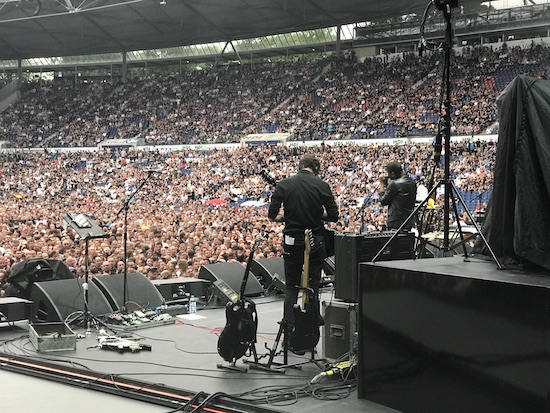
Fisher excuses himself to start vocal exercises, and I wander out into the stadium, which is gradually filling up with the first 20-or-30,000 members of the crowd. Algiers’ name flickers in giant red letters on the stage-side screens. Depeche Mode fans wander in their black and their branding – one man has a Violator t-shirt under a Songs Of Faith & Devotion purple waistcoat. Algiers come onto the stage to the sort of muted applause reserved for support bands nobody has ever heard of. It’s quite odd watching them on a stage so massive they’re like small black voles, yet the core strength of their music doesn’t vanish as you might expect it to. By the end, when Fisher’s voice echoes around this vast space, they’ve won over a good proportion of the crowd, at least at the front. You wonder though what it’s like in this time of vanished record sales, for Algiers to be doing this, what the purpose is. Later, a giant electrical storm hits Berlin. Lightning cracks the purple sky above the Olympic Stadium as Depeche Mode play a beautifully understated cover of David Bowie’s ‘Heroes’, a giant black flag of mourning flapping on the screens. Algiers are certainly the grandsons and heirs of the Bowie and Depeche lineage, but in an age of musical fragmentation… will anyone care?
The next day, sat in a high-ceilinged room where the yellow trains of the Berlin Ubahn rattle past the upstairs window of the more intimate Musik & Freiden club, Algiers are sanguine about the technical issues that they feel disrupted the previous night’s gig. "There are more people to witness, it’s more uncomfortable when your gear breaks, you can’t talk to them and talk shit and make a joke out of it," Mahan says. Unsurprisingly knackered (Tong yesterday said he was going to have a sober "Pepsi Night" but ended up getting back to their hotel at 6am) they’re suffering the usual privations of a band on the road, distracted, fatigued, amps blowing up, and so on. Get them talking though, and there’s no dimming of their zeal. It perhaps doesn’t always come across in their communiqués or interviews, but Algiers have a dry sense of humour, shaped as much by tour bus favourite Alan Partridge as anything from their homeland. They’re just not like anyone else, from this to their slamming together of noise, gospel and the kind of dramatic rock & roll preached by Nick Cave in his earlier years.
We talk about the differences between European fascist monumentalism and its American counterpoint in the bas relief sculptures of Confederate generals of the Civil War carved into Smokey Mountain. Then there’s conversation about the KKK, sex, religion, the corporatisation of NGOs as "bulwarks for neoliberalism" and why "platform" is a preferred word to "power" in the potential of their music to influence – "It’s a slippery slope," Fisher says drily. Yet Algiers still feel like curious outliers in their politics. If grime is inherently political because of where it comes from, both British and American indie rock, with a few exceptions, remain myopic and disengaged. Does it frustrate them that they don’t see the society that surrounds us all influencing more of their peers? “It’s the pernicious effect of the 90s, I think we still feel that,” says Tong. “One phrase that has entered the discourse is post-irony, and I think that level of irony and cynicism that was projected by so many groups working in that period made it really hard to be political, or even think about politics in relation to music without feeling that you were being overly earnest, or too serious. I think of the Friends-ification of culture. Friends is a dark stain on the 90s, it had this weird negating effect, that you could just cuddle and everything would be alright". Fisher agrees: "It was the white neoliberal paradise – New York City with no minorities". Mahan blames the "celebrification of culture, and supposedly independent artists who behave like they’re always at Coachella. The underlying questions about redistribution and sharing are not going to be there". He believes that the 90s then fed into the 00s when the irony became even more negative, developing a "superiority complex, with people thinking ‘Not only are we ironic all the time but we are superior because we know that politics is nasty, naive and cynical, we’re above that’. It really pissed us all off and made us want to go against it".
Downstairs in the hot and humid venue an hour later all the kinetic energy that last night was dispersed through the Olympic Stadium is compressed, and explodes. The crowd, like in London remarkedly mixed in age and gender, are alternately attentive and unleashed by Tong’s drums and Mahan’s fast yet louche basslines that ripple up and through the room. It’s a fine bedrock for Tesche’s melodies and noise, and most of all for Fisher’s voice. His fatigue seems to have vanished as he spins and sings, letting forth an arc of sweat, and at the end the people do not want to let him go.
In their evolution from inchoate rage to subtle potency, in their channeling of old theories to new ideas, in their capturing of sounds from across the generations, Algiers are distilling and critiquing the strange energies of our time and should not be ignored. The conviction that pumps through their music is a means of chiseling away at your own cynicism. Their artful aggression means that Algiers are profoundly out of step with what is hip in music right now. But as a north London gardener of pensionable age proved at 10pm on Thursday the 8th of June 2017, being out of step might just be the most revolutionary thing you can do in these topsy-turvy times.
"No matter how brutal and cynical the world is, you have to cling to something," Mahan told me earlier. "Nothing is total and nothing is sustained through sheer force and I think things can change, and I think that’s what’s magical. There has to be some slivers of hope."
Algiers’ The Underside Of Power is out now via Matador. For more music visit their website

